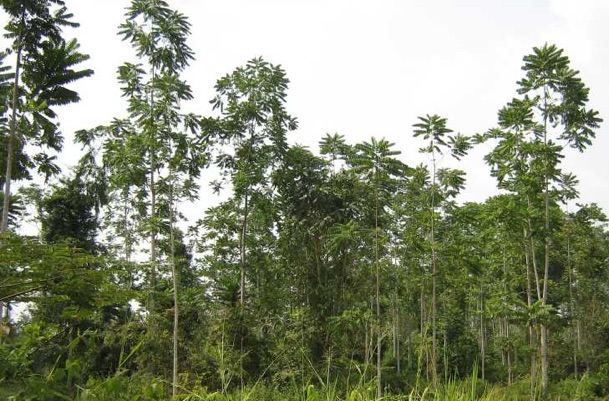Reforestation



The forest reform of 1995 has made reforestation mandatory, despite its continuing presence in act under the Ivorian legislation.
This mandate can be met either by effectively planting trees, or by paying a contribution to the Ministry of the Forest: several companies have chosen the latter option, as it is cheaper and effortless.
On the contrary, Tropical Bois has always been actively involved in reforestation, thanks to replanting experience gained in Italy starting in the 1940s.
In cooperation with the Ministry of the Forest and with Sodefor (the state company charged with managing the state forests), TB has always distinguished itself in the research conducted both on seeds and on reforestation procedures.
This effort has been officially recognized twice, in two different years, with the prize for the second best reforesting company in the Ivory Coast, as well as with a special prize for the research in biodiversity, won on the occasion of the “Day of the Tree 2001”.
In fact, after several studies in cooperation with Sodefor, Tropical Bois conceived the idea of the “assisted natural regeneration”, a method to help the forest to regenerate naturally.
This method allows a much larger variety of species to grow, rather than just a select fews as it occurs with traditional reforestation.
The procedure consists of aiding the survival of young plants of valuable species, already grown from naturally spread seeds.
Without aid these valuable plants would perish, since the environment where they presently grow is no longer the same as the one in which they were genetically selected to thrive.
The natural regeneration method first consists in recognizing the plants and recording them, then in cleaning the ground around them in order to protect them from aggressive grass and, where possible, in protecting them against herbivores.
This help effectively gives them a chance to grow until they are able to survive autonomously without problems.
This activity is certainly more costly than the traditional reforestation, as it requires cleaning, thinning out and subsequent re-planting, to maintain the correct density of plants.
Nevertheless, it allows the renewal of species that could not otherwise be replanted by traditional methods, as many species do not thrive if artificially replanted. As a result, this process preserves the natural biodiversity of the forest.
Until the end of 2018 Tropical Bois has planted about 4,900,000 new trees over 7,400 hectares with the traditional methods, and has cared of 350,000 plants over 320 hectares under the biodiversity plan.
Today TB operates 3 nurseries and grows about 500,000 new small trees annually, of which about 350,000 a year are planted, enough to reforest about 600 hectares annually.
Furthermore, Tropical Bois takes care of more than 90,000 plants with its method of natural regeneration.
All this against the logging, until the end of 2018, of 51,685 trees for the sliced veneer mill, 169,444 trees for the sawmill and 53,356 trees for the rotary veneer mill, that is a total of 274,485 felled trees.
Presently Tropical Bois is replanting about 25-30 trees for every one it fells.
For reforestation alone TB employs full time about 80 people year round, and about 160 people seasonally (8 months a year), all from rural areas.
The equiment includes 3 AWD trucks, 3 FWD pick-ups and 3 FWD cars.
Up until recently, the law imposed reforestation on farm lands, granting farmers the property of the trees, after the reforestation had taken place. These farmers were also allowed to choose the species they wanted to be replanted.
These rules are very disadvantageous to the replanting companies, as their expenses and efforts solely benefit others, and they are left without decisional power about planting species they need for their production.
Fortunately in the last years Sodefor has started entrusting a few qualified companies with the management of some forest lands: in fact Tropical Bois, being among these companies, is now reforesting mostly in a forest received in concession for the sole purpose of reforestation, in the Agbo region.
TB has also actively contributed with its own funds to educate the local population about the problems of forest conservation.
With the belief that the most effective way would be to educate the younger generations, TB decided to distribute to schools free comic books conceived and edited for this pedagogical purpose.
In cooperation with a young Ivorian artist, in 1999 TB published the first book, introducing the series of the “ Sage TéBé”.
Unfortunately this edition could not be distributed at that time, due to the coup d’état that happened in the same year.
Subsequent political problems have kept the authorities busy with more urgent matters, delaying TB's distribution of the educational series.
Finally in 2005 a second book was published, and four more in 2007. All editions are currently being distributed in schools, under the patronage of the Ministries of the Forest and of Education, completely funded by Tropical Bois.



